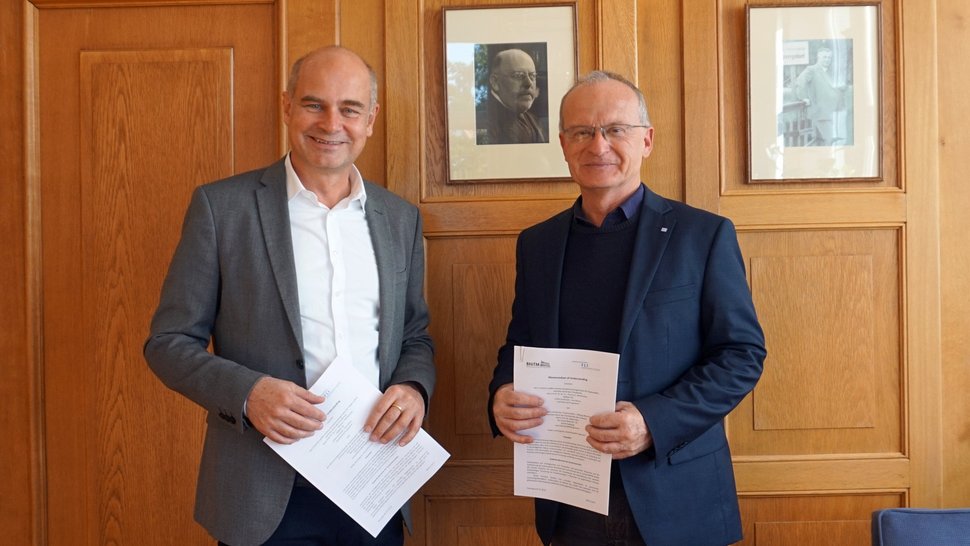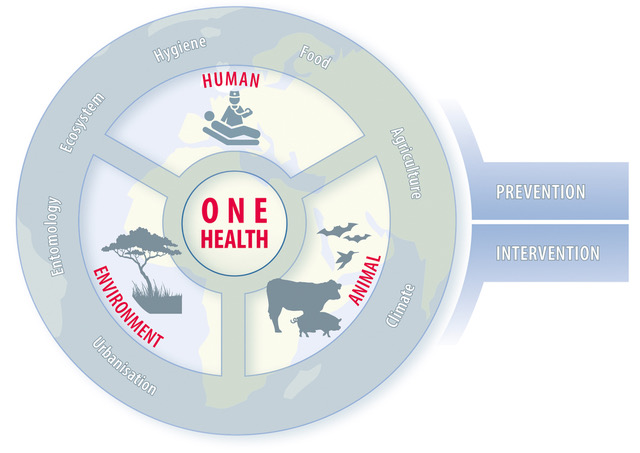One Health Day 2022
Bernhard Nocht Institute for Tropical Medicine and Friedrich Loeffler Institute join forces for One Health research
Hamburg / Riems Island 3 November 2022 - The coronavirus pandemic has shown that infection research must consider humans, animals and the environment at the same time. The Bernhard Nocht Institute for Tropical Medicine (BNITM) and the Friedrich Loeffler Institute (FLI), Federal Research Institute for Animal Health, are therefore intensifying their cooperation in the field of One Health research.

Animals and humans share habitats, climatic and environmental conditions - and many pathogens. Holistic infection research in the sense of the so-called One Health approach takes this into account in order to better combat diseases.
In the future, BNITM and FLI will considerably intensify their cooperation in One Health research. The heads of the institutes, Prof. Jürgen May and Prof. Thomas Mettenleiter, signed a corresponding cooperation agreement on the island of Riems. According to the agreement, the human medical research of the BNITM and the veterinary research of the FLI are to be linked even more closely than before. The aim is to combat mutual infectious diseases between animals and humans (zoonoses) more effectively and to sustainably improve human and animal health.
Synergies in teaching, research and research infrastructures
For example, the institutes want to initiate joint research projects in the area of One Health and apply for joint research funding for this purpose. Students, doctoral candidates and postgraduates will be able to participate in courses and seminars at the other institute and even conduct research at the partner institution. Scientific materials and publications are also to be shared.
BNITM and FLI hope for further synergies in the use of research infrastructures and in cooperation with partners in resource-poor regions, for example in Africa. Here, the institutes want to look for opportunities to set up joint research and training initiatives.
The President of the Friedrich Loeffler Institute, Prof. Thomas Mettenleiter: "One Health should not just be a concept, but a way of life. This must also be reflected in the research around One Health. We already cooperated with the Bernhard Nocht Institute in this sense when the term was not yet common. It is all the more gratifying to be able to further strengthen our joint work here."
The Chairman of the BNITM, Prof. Jürgen May: "I am very pleased that we are now deepening our existing cooperation into a strong partnership in One Health research. This will create new opportunities to effectively address global infections."

An outstanding example of how the MoU will be brought to life is the cross-institutional EU research project "Mobilise: A novel and green mobile One Health laboratory for (re-)emerging infectious disease outbreaks". It will be able to analyse human as well as animal and plant samples.
Background information
The Bernhard Nocht Institute for Tropical Medicine (BNITM) is Germany's largest institution for research, care and teaching in the field of tropical and emerging infectious diseases and a member of the Leibniz Association. Current research focuses on malaria, worm infections and other parasitoses as well as diseases caused by arboviruses and haemorrhagic fever viruses. For handling highly pathogenic viruses and infected insects, the institute has laboratories of the highest biological safety level (BSL4) and a safety insectarium (BSL3). BNITM includes the national reference centre for the detection of all tropical infectious agents and the WHO collaborating centre for arboviruses and haemorrhagic fever viruses. Together with the Ghanaian Ministry of Health and the University of Kumasi, it operates a modern research and training centre in the West African rainforest, which is also available to external working groups. In addition, the Institute maintains numerous other collaborations in other African countries such as Gabon, Nigeria, Tanzania and Madagascar.
The Friedrich Loeffler Institute, Federal Research Institute for Animal Health (FLI), is dedicated to the health of food-producing animals. Its central tasks are the prevention, diagnosis and control of animal diseases, the improvement of animal husbandry and nutrition, and the conservation and use of animal genetic resources. Another focus is the protection of humans against zoonoses, i.e. infections transmissible between animals and humans. The FLI cooperates with numerous international organisations such as the World Organisation for Animal Health WAOH, the UN Food and Agriculture Organisation FAO, the World Health Organisation WHO and the European Food Safety Authority EFSA, also within the framework of collaboration and reference centres and reference laboratories. Direct cooperation projects are also carried out with many countries worldwide.
One Health Day is an international campaign that aims to raise global awareness of the need for One Health research. The One Health approach aims to improve the health of people, animals and ecosystems in a sustainable way. It recognises that the health of humans, domestic and wild animals, plants and the wider environment are closely interconnected and interdependent.
Contact person
Prof. Dr Jürgen May (Chair)
Board of Directors
Phone : +49 40 285380-261
Email : chair@bnitm.de
Julia Rauner
Public Relations
Phone : +49 40 285380-264
Email : presse@bnitm.de
Prof. Dr Dr h.c. Thomas Mettenleiter
President Friedrich-Loeffler-Institut (FLI)
Phone : +49 383517-0
Email : thomas.mettenleiter@fli.de
Dipl. Biol. Elke Reinking
Press Office Friedrich-Loeffler-Institut (FLI)
Phone : +49383517-1244
Email : elke.reinking@fli.de







